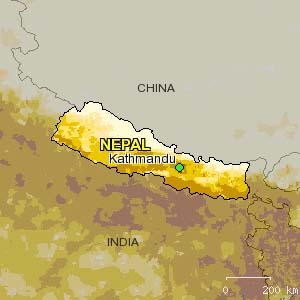Maoists warn of more protests as Nepal strike continues
 Kathmandu, Dec 21- Defying the government's call to withdraw their three-day general strike, Nepal's Maoist party Monday closed down the country for the second day amidst warnings of more disruptions if its demands were not met.
Kathmandu, Dec 21- Defying the government's call to withdraw their three-day general strike, Nepal's Maoist party Monday closed down the country for the second day amidst warnings of more disruptions if its demands were not met.
As the ruling alliance amassed riot police to guard the constituent assembly building in Baneshwar, the area in the capital that was the venue of fierce clashes between protesters and security forces Sunday, Maoist deputy chief Baburam Bhattarai held a street rally before the august building, declaring the protest would run its course till Tuesday.
Bhattarai, former Maoist finance minister and coordinator of the ongoing protest, said if the ruling parties failed to restore civilian supremacy by Tuesday, his party would launch yet more protests till the demand was met.
The former guerrillas are seeking to revoke the measure taken by President Ram Baran Yadav in summer that led to the unravelling of their eight-month government.
The Maoists sought to sack the chief of the army for insubordination but failed after the president re-appointed the general.
The former rebels, who ended a 10-year civil war in 2006, say the president is a figurehead with no power to undo the decisions taken by an elected prime minister.
Guarded by party cadre and watched by hundreds of curious onlookers, Bhattarai said the current government was deliberately trying to provoke Maoist protests to use it as an excuse to block the promulgation of a new constitution in May 2010.
If the new statute was not enforced by May 28, as pledged in the peace pact that ended the civil war, Bhattarai said the elected constituent assembly - that also serves as Nepal's parliament - would be dissolved.
The ruling parties, he said, wanted that so that they could impose President's Rule and a new army-backed government reminiscent of deposed king Gyanendra's ill-fated attempt in 2005 to impose a military-propped regime.
However, if that happened, he warned that "hundreds of thousands of Nepalis" would rise up in revolt and seize power.
"It would be an unimaginable situation," the former rebel leader warned.
Meanwhile, an alarmed UN called for restraint amid reports of widespread violence.
"I call on all groups to exercise restraint, to avoid provocation and to reduce tension through dialogue," the UN's top human rights official in Nepal, Richard Bennett, said in a press statement.
Bennett, who heads the Office of the UN High Commissioner for Human Rights in Nepal, said the display of violence was "some of the worst on the streets of Kathmandu for several years, perhaps since Jana Andolaan-II (the pro-democracy protests against deposed king Gyanendra's army-backed reign in 2006)".
"It must not be repeated and those responsible should be held to account," the UN official said.
Despite the appeal, tension continued to simmer nationwide Monday. At least six vehicles had been attacked in the morning while hundreds of supporters, mostly young men, continued to patrol roads and highways, waving party flags and flourishing batons.
Thousands of people were stranded on the highways leading to India due to the disruption in transport. Indians who had come to Nepal's border towns in the southern Terai plains for medical treatment, work or to meet family members, were left in the lurch by the general strike, unable to return.
Thousands of Nepali labourers, either bound for Indian border towns or returning home from there, also faced great hardship.
The Chamber of Commerce and Industries in Birgunj, the hub of India-Nepal trade in the country, issued a statement Monday, asking workers to report for work and warning it was implementing a no work, no pay-policy for the three days of the general strike.
Nepal's state media said the closure was costing the buffeted economy a loss of NRS 1.2 billion daily with wage workers being the hardest-hit. (IANS)